Authors — Nicholas Rombes
-
The Blue Velvet Project, #13
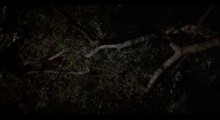
Second # 611, 10:11 This gliding shot, showing the underside of trees as Jeffrey walks the nighttime streets of his neighborhood, loomed large in my imagination after seeing the film for the first time in 1987. I wouldn’t see Blue Velvet again for many years, and in that time these few seconds of footage assumed meaning and feeling wildly disproportionate to their importance in the film. I can’t really account for this and, to be honest, when I set out to do this project I did it with the intention of not writing very much about my own personal stake […]
by Nicholas Rombes on Sep 5, 2011 -
The Blue Velvet Project, #12
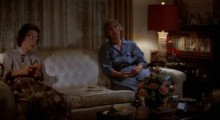
Second #564, 9:24 Jeffrey comes down the stairs of his home. It’s night, and his mother (played by Priscilla Pointer, the real-life mother of Amy Irving) and Aunt Barbara (Frances Bay) sit on the sofa watching a black-and-white crime drama on the television. Positioned on opposite ends, the space between them opens up like some sort of haunted void where someone (or something) else should be. In Lynch’s films, sofas—which seem like the most harmless piece of furniture possible—become uncanny objects, spooky places that are so familiar that they become unfamiliar. There is one more point of general application which […]
by Nicholas Rombes on Sep 2, 2011 -
The Blue Velvet Project, #11
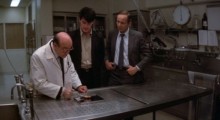
Second #517, 8:37 Peter Carew, who plays the coroner and who appears onscreen for just under twenty seconds, delivers perhaps the most tilted line in the movie: “We’ll check the morgue records but I don’t recall anything coming in minus an ear.” This either could be the punch line to the whole sordid blood-drenched twentieth century, or else a few words tossed off by a bald man who refuses to look at the characters on screen with him, as if he speaks to (into?) the ear and the ear alone. Blue Velvet was Carew’s first movie in twenty years. Previously, […]
by Nicholas Rombes on Aug 31, 2011 -
The Blue Velvet Project, #10
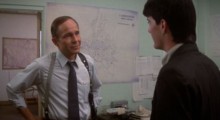
Second #470, 7:50 1. Detective Williams greets Jeffrey, who has come bearing an ear in a bag. He stands face to face with the archetypal detective, who wears his holster and gun in the office. He is either a man who has repressed a lot, or a man who is completely open and comfortable with the fact of evil in the world. His eyes are sad and knowing and also suspicious. Actually, Jeffrey is the detective, and he might as well be saying, “I found the ear. This is my case. Stay far away.” 2. Lynch has said that “clues […]
by Nicholas Rombes on Aug 29, 2011 -
The Blue Velvet Project, #9
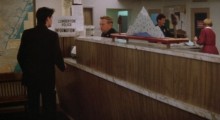
Second #423 / 7:03 FOUR ASIDES 1. Holding the brown paper bag with the human ear in his hand, Jeffrey enters the Lumberton Police Station and asks, “Do you have a Detective Williams still working here?” There is a small-town familiarity to this shot, but also a hard-to-define, wavering menace, something you can feel but can’t quite detect. Some of this is generated from the stern, accusatory looks those in power give Jeffrey, as in this scene where the police officer behind the counter stares—his face unmoving—at him as he turns to go to Detective Williams. The same sort of […]
by Nicholas Rombes on Aug 26, 2011 -
The Blue Velvet Project, #8
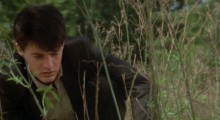
Second # 376 (6:16) In his 1932 essay “A Course in Treatment,” Sergei Eisenstein wrote that “only the sound-film is capable of reconstructing all phases of the course of thought” in the mind of a character. In many ways, Blue Velvet’s most radical experiments are in the realm of sound. In this frame, Jeffrey, having just discovered the severed ear, absorbs this fact, the fact of sound. And so: *During the 5:50s, as Jeffrey walks home through the field after visiting his ailing father, the noise is diagetic: the sound of Jeffrey walking, the birds, the insects—all these sounds seem […]
by Nicholas Rombes on Aug 24, 2011 -
The Blue Velvet Project, #7
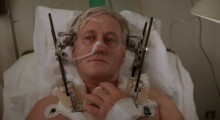
Second #329 Jeffrey’s father is in the hospital, from a scene whose unstable tone is a microcosm of the movie itself. On one level, this moment is almost painfully tender. Jeffrey’s father struggles to speak with him as Jeffrey looks on, helpless. Yet on another level, the scene feels almost like a parody of an As The World Turns hospital scene*, with the overdetermined nurse and doctor, who ushers Jeffrey into the room by the elbow. It’s as if Lynch stuffed every hospital-like contraption into the frame; Jeffrey’s father seems beset by many illnesses. Lynch holds the shot of the […]
by Nicholas Rombes on Aug 22, 2011 -
The Blue Velvet Project, #6

Second # 282 An establishing shot of downtown Lumberton/Wilmington, showing the courthouse (from the back) in the mid foreground. In the previous shot, we have just seen Jeffrey for the first time as he walks through the field, wearing black. He stops, picks up a stone, and throws it as some junk. He then keeps walking, his back to the camera. At this point, we don’t know who he is or where he’s going. That shot is followed by this, at second #282, a static shot that lasts three seconds. When I began this project I wondered how frequently frames […]
by Nicholas Rombes on Aug 19, 2011 -
The Blue Velvet Project, #5
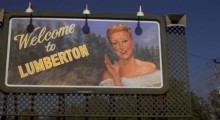
Second #235 What is this? Where are we? In a weird, dreamlike echo of the Amity Island billboard (defaced with the black shark fin) from Jaws, the Welcome to Lumberton billboard is a nest of contradictions. Instead of a shark fin, there should be a monster lurking in the background pine trees. The woman looks to be freeze-dried straight out of the Cold War, and brings to mind Shelley Winters as Charlotte Haze in Stanley Kubrick’s Lolita (1962). Could the awkward wave of her hand be any more artificial or uninviting? For a moment, we seem to have gone back […]
by Nicholas Rombes on Aug 17, 2011 -
The Blue Velvet Project, #4
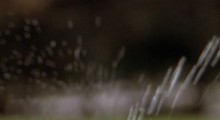
Second #188 Jeffrey’s father has just suffered a stroke while watering his front yard, and has fallen to his back, writhing in pain, the hose that he still holds—in a sad and funny and helpless way—spraying water all around. That shot is followed by this one, as the camera pans slowly down, the background a blur, capturing the water in mid-air as Bobby Vinton sings “Blue Velvet,” which he had released in 1963, several months before the assassination of John F. Kennedy. The song, written by Bernie Wayne and Lee Morris, dates back to 1950. Wayne was a prolific composer, […]
by Nicholas Rombes on Aug 15, 2011
